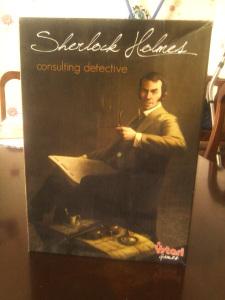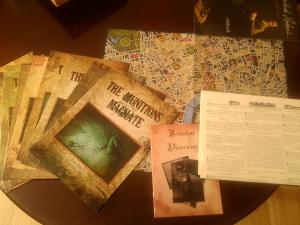
Sherlock Holmes Consulting Detective is published by Ystari games. It is designed by Gary Grady, Suzanne Goldberg and Raymond Edwards. It plays from 1-8 players (although it can have more) and takes as much time as you need to solve the case!
I don’t think I’ve mentioned it too much on this blog but over the last couple of years I’ve become quite the fan of Mr. Holmes. I read through all of the Conan Doyle stories, watched Sherlock, the recent films with Robert Downey Jr., Elementary, the old films with Basil Rathbone and Nigel Bruce, a number of other films, some with Christopher Plummer, there’s another good film called They Might Be Giants, which is about a man who believes he is Sherlock Holmes, and at the moment I’m working my way through the Jeremy Brett tv series and telemovies. This game is currently in print, although it was originally published in the 80s I believe. In this game you are not in face Sherlock Holmes, rather you are one of the Baker Street Irregulars given leeway by Holmes to investigate various crimes and test your powers of deduction.

These are the contents of the game. The rulebook is in the top right-hand corner. To the left are the ten cases you will be working on, next to that is the London Directory that has the names of people and businesses and places you can go to pursue leads. There are also newspapers, one for every case, and a map of London. And that’s it!
The game is very simple. You open up the casebook and read the preamble, and don’t worry, I’m not going to spoil anything in this review because the joy of the game is discovering all this for yourself. But after you find out what’s wrong you are sent off with the freedom to go and question whoever you want. Each person in the Directory has a reference, which corresponds to a passage in the Casebook. You will go to that (they’re divided up into NE, SE, NW, SW, although because it’s translated from French some of them are WC and EC, but its not terribly difficult to figure out what the references mean). Then, if there’s a passage you read that, if there isn’t you know that the lead is a dead end. You’ll make a note of how many leads you visit, and at the end the booklet will tell you how many it took Holmes. After answering a few questions about the case you’ll take away points when you compare how many more leads you took than Holmes and then compare your score with the master detective (or, more likely, you’ll end up realizing that you made a huge error in judgment).
So the game gives you a huge amount of freedom as the whole of London is at your disposal. If you get stuck there are a number of people you can always turn to, like Mycroft Holmes, Inspector Lestrade, or even Holmes himself, although I’d hate to be the recipient of his withering disappointment.
So far I’ve played through the first two cases and they’ve been such fun experiences, although I have only played them with one other person so I can’t comment on how they’d play with groups. The game does give rules for competitive play but for me I automatically went co-operative because it’s so much fun discussing theories with other people and debating which leads to follow next or whether you think something is a red herring or not. It’s so fascinating and soon after the case begins you’re completely engaged and before you know it two or three hours have passed.
These are all original cases as well (as far as I know) so even if you are a Sherlock fanatic and know all the cases off by heart this will still give you plenty of surprises. Now, I’m sure I’m not the only one that, after watching anything Sherlock-related instantly wants to go out and solve crimes, this game gives you the opportunity to do so but it quickly shows you why you are nowhere near as good as Sherlock. I played the first case with my friend Jason and we ended up with -60 points! That’s not a typo, we really did get minus, and we got the actual solution wrong as well. We were so convinced and confident that we had it all worked out, and then we realized we had missed so much, and yet being so utterly wrong was so much fun! I played the second case with my friend Ayla and we actually managed to crack it, which made me so happy. I attribute that to the fact that she was more organized at taking notes than either I or Jason were. In all of the games I’ve played since I’ve gotten into the modern board gaming hobby there has been nothing that has compared to the excitement when I developed a theory and had it confirmed by a lead we visited. It’s so utterly, utterly engrossing that you forget it’s a game and you’re on the edge of your seat trying to work out who did what and why they did it.
I love this game so, so much. As a fan of Sherlock I love the flavor it brings out. There’s so much that’s been poured into this game, the casebooks are lovely to look at and read. The passages are well-written, the map is interesting to look at, especially when you get a location and realize how close it is to something else. And then there are the newspapers that all have articles, some of which pertain to the case, some don’t, and some even have references to things down the line, so in every subsequent case you have to refer back to all the newspapers so far, just in case there’s anything there. The Directory is superb as well, with so many names and establishments that it really does give you the feeling you’re going around asking all these people questions.
It’s easy to learn, but I think the free-form nature of the game may be jarring for some people. It does stutter a bit at the beginning after you’ve been introduced to the case and you have to just start. There’s no turn order or first-player markers, no board to track your progression, it’s all up to you, but once you understand that you can do anything you quickly submerge yourself in this murky sea of murder and crime.
So, it’s pretty obvious that I love this game and I recommend it highly, without question. However, let’s talk about a few negative things.
Since it’s been translated from French there are a few typos and these can be jarring. However, given how much text is in the game it’s kinda forgivable and you can always tell what the word was supposed to be. I’m generally forgiving with these anyway, but it’s not like they’re in every paragraphs.
Sometimes it can seem like the game is a bit unfair to the players, as there’s no way that you’ve ever going to beat Holmes. But, you know, he is the master detective and I don’t think you should really be aiming to beat Holmes, you should just aim to figure out what’s going on. However, sometimes it’s difficult because you can’t actually tell whether someone is lying or not, but the technology doesn’t exist for such a game yet.
The other big complaint, and it’s kind of a double-edged complaint really, is that there are only ten cases. Now, that sounds overly harsh because this game is amazing and if there are only ten cases then so be it, they still give ten (well I hope the other eight are as good as the first two) memorable experiences that last for 2,3,4 hours. But once you’re done with the cases you can’t do them again, unless you suffer from memory loss or manage to get your hands on a mind-wiping device. So there’s a temptation to let it linger until ‘the right moment’. I’m trying to savour them and not go through them too quickly, but I’ve still got eight left and the first two have been so good it’s much better to play them than to let the game wallow in anticipation. Plus, once I’m done I think I may lend it to friends or family and spread the love!
There have been a couple of expansions but since they were released in the 80s they haven’t been reprinted, and are very hard to track down. I think they’ve only been published in the original French as well. But I’d love to see more cases from this game because it’s such a good experience. I mean, me and Ayla spent at least three hours playing and then another hour or so talking about it. Sometimes you’ll realize how stupid you are and you’ll laugh at yourself, but other times you’ll hit on a solid theory and you’ll actually work it out, and it genuinely feels like you’ve accomplished something. It’s a special game and there’s not really anything else out there like it. I love it, and I think if you get it you’ll love it too.
